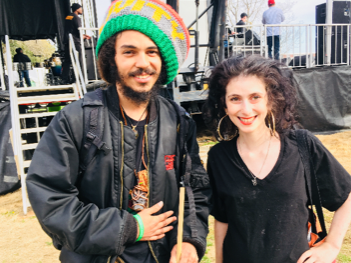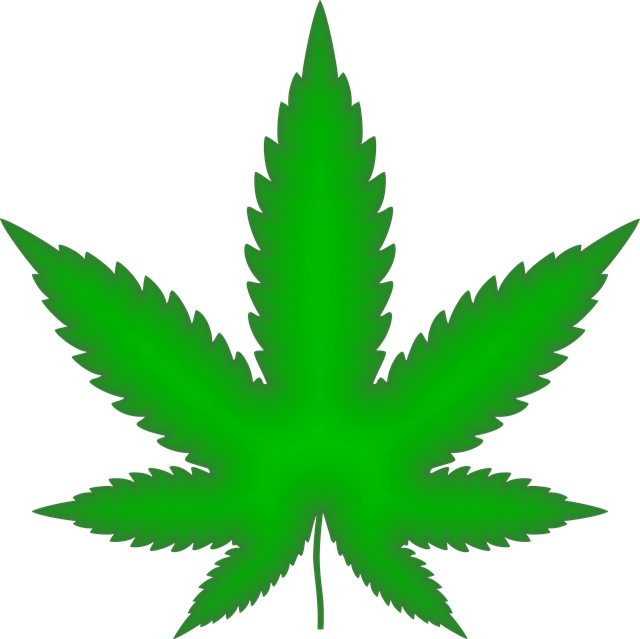This is the true story of a nice Jewish girl’s adventure at the National Cannabis Festival in Washington DC.

I went on a quest to find intersections between Judaism and the healing aspects of cannabis. Although Cannabis Fest DC is a Mecca of marijuana education, culture, and music, my journey with marijuana’s medicinal qualities began a long time before I found myself there. I suffer from an autoimmune disease that affects my liver and causes extreme pain. The powerful medications that I’ve been forced to endure have way too many serious side effects. And since I’m on the autistic spectrum, I have also sought comfort to rescue me from debilitating social anxiety.
As a self-identifying hippie, I wanted to find a more natural way of controlling pain, as well as my anxiety, which is how I found my way to weed. Marijuana oil is the key, making healing easier and everything more manageable, not just for me but for my family. Trust me, I know from the anxiety, restlessness, and outbursts of fear. It’s about quality of life and the opportunity to feel safe and free the mind from hyperfocusing, a tendency that comes with spectrum disorders.
That being said, it was extremely hard for me to get a medical marijuana card because medical marijuana wasn’t always legal in Maryland. However, I finally received my card and not a moment too soon – just in time Cannabis Fest DC.
Cannabis Fest wasn’t just educational but full of great music from Cypress Hill to Backyard Band. The hip hop Cuban threesome Cypress Hill performed a set of marijuana-friendly music with songs like “Hits from the Bong.”
While attending the festival, my main goal was to learn more about Takoma Wellness Center, founded by Rabbi Jeffrey Kahn and operated by his family. Takoma Wellness Center’s branding was a welcome addition at Cannabis Fest with its hamsa hand logo, also known as the Hand of Fatima or Hand of Miriam, which is a common symbol shared by Muslims and Jews.
I had the opportunity to speak to Paula Kahn, who is an occupational therapist and Takoma Wellness Center’s director of community engagement. When asked if kush was kosher, Kahn replied, of course. “Cannabis is an herb, which is kosher, unless you’re going to combine it with other ingredients that aren’t kosher,” she said.
In terms of the relationship between Judaism and cannabis, she explained her father-in-law’s philosophy: Rabbi Jeffrey Kahn became a rabbi in the early 1980s during the HIV/AIDS epidemic. Jews would inquire about the ethics of giving their AIDS-stricken family members marijuana, which eased their pain. What inspired him to become a cannabis dispensary owner is the idea that God doesn’t want individuals to suffer, he often explains. Because you can’t overdose on marijuana and there are so many medicinal purposes, it can be an effective – arguably holy – tool for managing chronic pain.
“From a Jewish perspective, I believe that providing cannabis is a mitzvah to make those suffering more comfortable,” Paula Kahn said.
I later learned that Israel is a global leader in medical marijuana research. Officials like to point out that Israeli researchers are not constrained by limits in the United States, where marijuana is classified as a “dangerous drug.”
According to Haaretz, Israel has been positioning itself as a leading country in the field of researching the benefits of medical marijuana, with a Health Ministry that encourages research, the number of Israeli growers has increased and researchers have been able to collect evidence on which strains and compounds seem to work best for patients with specific conditions.
For example, an Israeli study suggested that cancer patients also benefit from medical marijuana, which enhances the ability of their immune systems to attack cancerous cells in the body.
Even members of the Orthodox establishment are on board with weed for medicinal purposes. Rabbi Menachem Genack, the CEO of the Orthodox Union’s Kosher Division, supports the usage of medical marijuana when needed.
“Using medical cannabis products recommended by a physician should not be regarded as a chet (a sinful act), but rather as a mitzvah, an imperative part of Judaism,” Genack said in a statement.
Or to quote Cypress Hill, “The herb is more than just a powerful potion,” so to answer the question, kush is definitely kosher.
Michele Amira Pinczuk recently graduated from the University of Maryland with a degree in broadcast journalism. She writes for the Washington Jewish Week, The Source Magazine, the Jewish Food Experience and other publications. When she’s not writing articles, she’s doing Israeli dancing, Zumba, and yoga or making margaritas.

